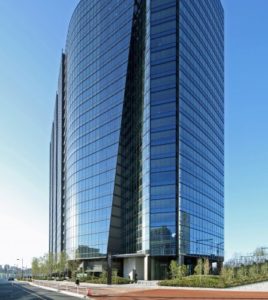
Andrea Marini,
CEO, Deltatre
From intensifying wildfires in the US, to floods in Australia, and what is likely the worst drought in Europe for centuries, 2022 is a stark reminder of the real-world impact of climate change globally.
What we are all experiencing is unlike anything we've seen in our lifetime, and it is becoming clear that the window for action is closing. As a business with well over a thousand full-time team members across 14 countries, we have a huge responsibility, and opportunity to effect real change and this is true for business leaders across our industry. Working proactively on environmental reporting and performance-related initiatives to reduce our environmental impact has never been more vital. I want to know that business decisions we make at Deltatre are working to protect the planet for future generations. Now is the time for action that will make a difference. Despite how challenging implementation can be, by doing this collectively our industry can make a significant difference.
For many organizations, they are already on the road to sustainability by committing to goals set with the Paris Agreement. This UN initiative calls for businesses to pledge making tangible changes to their carbon footprint that would limit global temperature rises to 1.5°C above pre-industrial levels. This involves reducing emissions by 45% by 2030, to reach net zero by 2050. But what does that mean in real terms for the media industry?
The importance Net Zero by 2030
Despite the ambition of the Paris agreement, both the effects felt this summer and the data on global warming confirms that action to mitigate the impact is falling short. Based on the current Climate Action Tracker thermometer, we are on track for 2.7 degrees of warming based on real world action and current policies. We are currently at around 1.2 degrees and significant action is needed to stem rising temperatures and limit the effects that are now being keenly felt across the globe.
To achieve this, the 2050 timescale for net zero needs to be revised with a goal to reach net zero by 2030. It is a big ask, but leaving the 2050 targets in place will almost certainly mean we are guilty of doing too little, too late. As we experience the extent of the impact of global warming on the planet, as an industry we have a responsibility to acknowledge there is more we can do and implement it. At Deltatre, we are firmly focused on achieving net zero by 2030. We are taking stock and already have some secured action plans. Like the whole industry, we’re working hard to complete climate action plans associated with every aspect of our vast business on the accelerated timescale needed for a 2030 deadline.
Offsetting as a last option
Having established the net zero aim needs to come much sooner, the next step is to look at how. There is of course a place for carbon offsetting, where businesses can invest in environmental projects to balance out their own carbon emissions. However, this should only be done after most of the emissions in business operations are reduced and avoided. After that, an acceptable 5-10% of unavoidable emissions may be offset. To try and carry on with ‘business as usual’ and just pay to offset emissions is unhelpful and is of little benefit for the planet. There are not enough projects to make mass offsetting a viable option – we must reduce business emissions across multiple areas as soon as possible.
Businesses therefore need to analyse their existing practices, identify the emissions, and find a way to introduce changes which allow for reductions. There isn’t a magic wand or silver bullet when it comes to making the changes needed to slow the rate of global warming. It requires commitment from senior leaders in businesses and buy-in from all stakeholders. That way when changes are challenging to implement, everyone can understand the reason for it and transformation is more likely.
The benefits of a business-led approach
So, following the initial phase of analysing, what should action look like? Businesses have a huge role to play. In the UK businesses account for almost a fifth of carbon emissions meaning if they take action to move to net-zero we will see significant benefits. However, businesses also have huge influence. They have the opportunity to educate their employees and customers which means the potential positive impact of businesses is actually even greater.
The reality of climate change and pollution is stark – take as an example that there is now no clean water anywhere on earth. Despite this research hitting the headlines, for many it has flown under the radar. This demonstrates how critical it is that we as businesses take responsibility for educating our teams.
This process can take many forms from educational seminars for employees, to on-the-ground environmental work such as a cleaning up a local river. Regardless of format it is a foundational part of ensuring businesses make long term changes that benefit the environment. It not only makes a positive impact in its own right, but creates behaviour shifts in employees’ personal lives that take the potential impact beyond the 18% business emissions we mentioned. Furthermore, by shifting the mindset of the workforce, we change the overall business ethos putting sustainability at the centre. The impact is that business decisions organically keep environmental goals in mind. This makes the process of taking positive action on climate change part of conducting business as usual which is a big step in the right direction when it comes to achieving net zero by 2030.
Getting our heads into the cloud
With that environment-centric approach in mind, how can our industry specifically have a positive impact on climate change? The media industry has changed drastically as a result of Covid as the pandemic forced more remote working. It meant teams that would normally travel to work on-site shifted to a cloud-based strategy in order to deliver business as usual when the world turned upside down. Those changes may have been forced by pandemic practicalities, but they should be embraced as part of our sustainability strategies.
Take for example the broadcast graphics for Indian Super League. Previously broadcast graphics would have been produced by a team on-site involving significant carbon emissions from long-haul flights. The pandemic made this impossible and made a shift to a remote, distributed operations model essential. We saw that this change did not impact the ISL’s ability to successfully deliver the 2020-2021 season. Given that business travel is one of the highest sources of measurable carbon emissions, exploring cloud-based models that have proven they are capable delivering the same level of services is a big step in the right direction for our industry.
Moving forward
Making significant behavioural changes and adapting how we as an industry work will undoubtedly have a positive impact on our carbon footprint. However, the data couldn’t be clearer in showing us why we must take on the challenge of meeting adjusted 2030 targets to limit the damage we are inflicting on our planet. We must continually reflect on how we can improve, from encouraging behavioural changes to adapting how we develop solutions and deliver services to minimize the environmental impact. Meeting climate ambition targets must be seen as ongoing journey not a box ticked; only by taking this approach can our industry play its part in putting the earth on the trajectory it needs to be on to protect it, both for us and generations to come.









